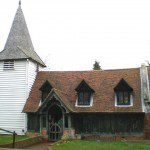To be quite honest, when reading the publicity, this talk was the one that most inspired me to attend the Theology for All conference. Mark is somewhat of an expert on Church history, and in particular the Puritans. As a pastor, he is concerned not merely with transferring knowledge to his congregation, but also in showing them the lessons to be learned from what has happened in the past.
Mark underlined the old maxim, “What one generation knows and teaches, the second generation assumes, and the third generation loses.” Our study of Church history is to insure that we don’t fall into the same trap.
He explained that some people have mocked his interest in the Puritans. He has heard all the old jibes: “The Puritans hated bear bating, not because it gave pain to the bear, but because it caused pleasure to the viewers.” Or, “The Puritans went to America because they were hoping to find more restrictions than were permissible under English law.” They are often characterized as those who were afraid that somebody somewhere might be having a good time! Dever does not believe those descriptions to be accurate.
 Dever spent time focusing on Richard Sibbes. He began by explaining that Sibbes argued that the killing sin that many religious people lay under is a dead formality. Sibbes was eager to underline that the Spirit is the one who quickens, not mere words and structure. Spirit-less Christianity is no Christianity at all. He was no mere formalist himself.
Dever spent time focusing on Richard Sibbes. He began by explaining that Sibbes argued that the killing sin that many religious people lay under is a dead formality. Sibbes was eager to underline that the Spirit is the one who quickens, not mere words and structure. Spirit-less Christianity is no Christianity at all. He was no mere formalist himself.
Sibbes was a great success. He was able to preach the Gospel faithfully throughout his life. Sadly, many he influenced to become preachers did not find the same ease in the established faith.
Sibbes had a great optimism in the progress of the Gospel. He was even optimistic when godly people endured trials. His view of the Church was typical of the “magisterial reformers” (e.g. Calvin, etc.). The common thread was that the preaching of the Word was the heart of the Church.
Sibbes and his Puritan brethren had an evangelical vision of the Church. They wanted to see freedom in order that the Gospel could be preached. He firmly believed in the centrality of the right sort of preaching for the health of the Church.
“Death came in by the ear . . . so life comes in by the ear.” What happened to Adam? He heard a voice he should not have heard. In the same way, the Gospel is heard.
Sibbes did not worship preaching, however. He argued that “unless the Spirit of Christ quicken them,” preaching and the Word were useless. It is the preaching of the Gospel rightly anointed that will reveal Jesus to us. The Spirit flows with the doctrine that we hear according to Sibbes. Sibbes expressed himself fully, with passionate emotion.
What lessons can we learn for today? Sibbes challenges us with the centrality of preaching. Preaching is more fundamental than Church authority structure. Sibbes had friends who were Congregationalists and Presbyterians. He wanted the Gospel to go forth in all churches. Denominations are secondary pragmatic creations. In fact, denominations are parachurch organizations. It is the local church that is entrusted with the preaching.
Preaching is generative—it creates new life. It is by the Holy Spirit taking the preaching of the Gospel and bringing life that people are saved. The solution to our problem is neither making our churches as ‘pure’ as possible (i.e. a rigorous application of church discipline). Nor is it making our churches as nonthreatening to visitors as possible. Rather we must allow God’s Word to take center place. Preaching is more important than whatever else happens in the church’s meetings. The Spirit restores the ability of the soul to appreciate God, and enables man to desire him.
Our social action is not as important as preaching the Gospel! Preaching is more central to the health of your church than anything else you can think of. The great trunk of the Puritan view of the Church is that the Gospel preached is the hope of the Church.
















